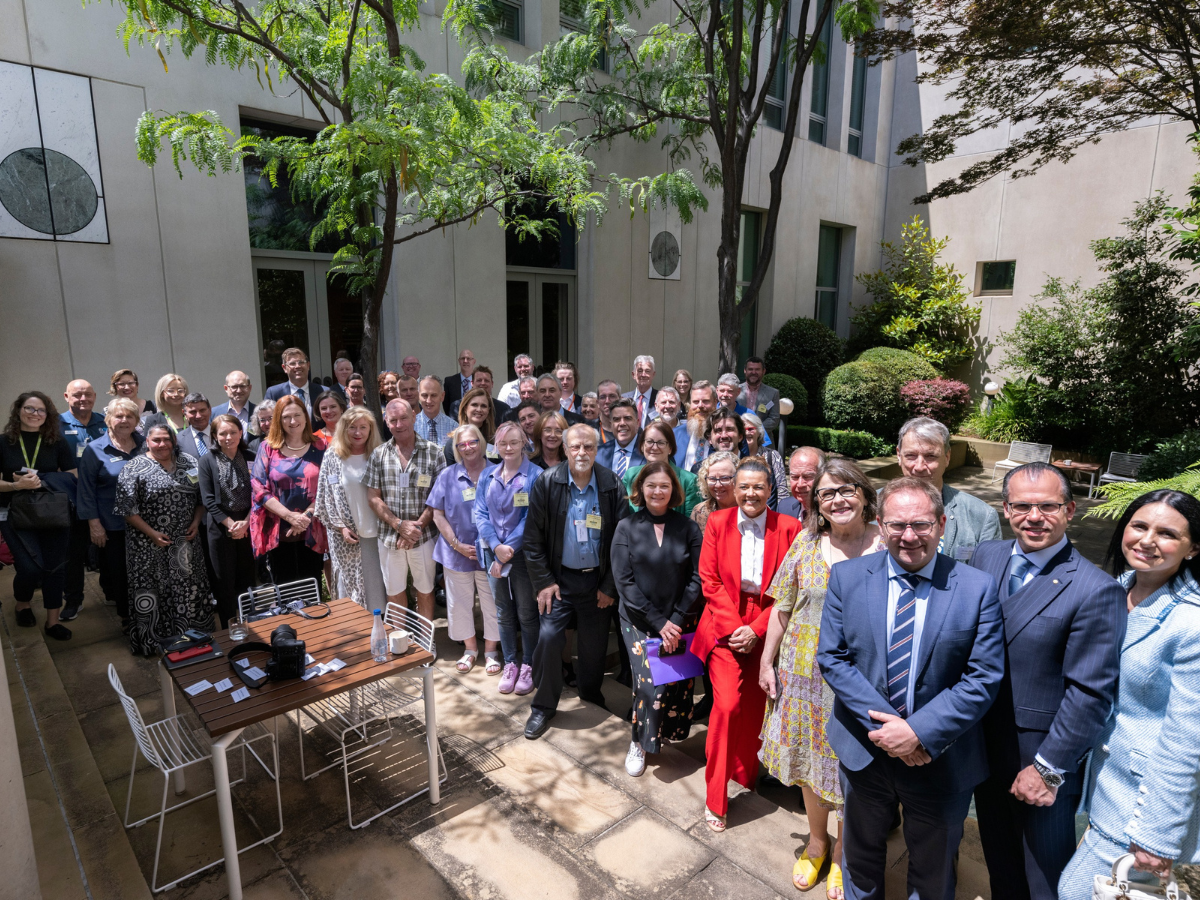20th anniversary of the national asbestos ban commemorated in Parliament House Canberra.

On 31 December 2003, a complete ban on the use of asbestos in all forms came into effect in Australia. Fast forward twenty years, and stakeholders, including support organisations, government agencies, union representatives, health professionals, and researchers, gathered at Parliament House in Canberra to commemorate this historic milestone.
During the event, Minister Burke delivered a poignant statement in the House of Representatives, acknowledging the efforts of campaigners, remembering lives lost to asbestos-related disease, and emphasising the ongoing fight against asbestos. Jo Morris, the Co-founder and Managing Director of Reflections, was present to witness this momentous occasion.
“The Minister’s words in the House were powerful and emotive, especially for those of us personally affected by the devastating impact of asbestos. My Dad was a hard worker. It doesn’t seem fair that simply doing his job cost him his life. Asbestos is an ongoing hidden danger in our community and I’m proud of the work the Reflections team do to reduce the ongoing impact.”
Jo Morris
Below are highlights from the event and excerpts from the Minister’s speech.






“Many Australians will not realise: it was only 20 years ago, on 31 December 2003, that a complete national ban on the use of all forms of asbestos came into effect. The story of that ban is one of tireless advocacy by many who were denied justice themselves—by workers whose own lives were cut short by a scourge that government and industry failed to prevent; by workmates, shop stewards and union delegates who questioned workplace practices and were ignored; by families who saw their fathers and brothers, mothers and sisters taken from them too soon. Yet these Australians, in the face of personal tragedy, spoke up to protect others. They spoke up for the most basic of principles: that no one should die at work.
“It wasn’t just tragedy; it was injustice. It could have been prevented. The significance of this anniversary won’t be lost on those of us gathered here today. Asbestos remains the greatest workplace tragedy of our time—the single biggest killer of workers in Australia. And we’re still living with its legacy, to this date. Twenty years after it was banned, asbestos-related diseases claim the lives of over 4,000 Australians each year. That’s three times the national annual road toll. Over 700 of these deaths can be attributed to mesothelioma, a terrible, aggressive form of cancer that typically strikes people down many years after initial exposure.
“These deaths are a tragedy, each one representing immense grief, pain, hardship and loss, which is why we owe our gratitude to the many individuals and organisations who fought so hard for the ban and to ensure the victims of asbestos exposure received justice and support—people like Bernie Banton, a powerful campaigner for victims of asbestos, who fought long and hard to ensure all those affected received compensation. He died, as a result of his asbestos exposure, in 2007.
“The 2003 ban was a great achievement, but it’s only part of an unfinished story. Asbestos remains in millions of buildings and structures across Australia. It’s estimated that one in three homes has asbestos in them. In all, around 6.2 million tonnes of asbestos-containing materials are thought to remain in our built environment. These materials are old and, as they age, they degrade, increasing the risk of releasing deadly asbestos fibres, and more frequent extreme weather events, such as floods and fires, are also increasing the risk of asbestos exposure and environmental contamination. In short, the risk of asbestos exposure is not over. Much needs to be done to address this deadly asbestos legacy. More needs to be done.
“Through the leadership of the Asbestos Safety and Eradication Agency, whose chair, Paul Bastian, and CEO, Jodie Deakes, are here today, along with many of their staff, all governments will soon come together to set out a new five-year strategic plan to put that legacy squarely behind us. That ongoing work is essential if we’re to hold true to the efforts of all those who campaigned over decades for justice for victims. The agency has recently published findings that, if we had sustained and coordinated by all governments, we could remove all asbestos from our buildings by 2068—it takes that long—in doing so, preventing up to 27½ thousand deaths from asbestos-related diseases.
“As we head into the next stage of the fight against asbestos, we acknowledge the valuable work of a generation of individuals and organisations, including many in the gallery today. But I also want to acknowledge all of the asbestos disease support groups across Australia and their efforts to support victims of this deadly material…
“To all those—and there are many of them in the gallery right now and some on the floor behind it—who have over the past 20 years and more championed the plight of workers affected directly by these dust diseases: you have saved lives. To all of you who continue to champion those workers now and into the future: you continue to save lives. Your efforts are as important now as they were 20 years ago, and your government stands with you.”
Minister Tony Burke, Statements of Significant Matters Speech, read in Parliament House Canberra December 2023.
BACK TO NEWS


